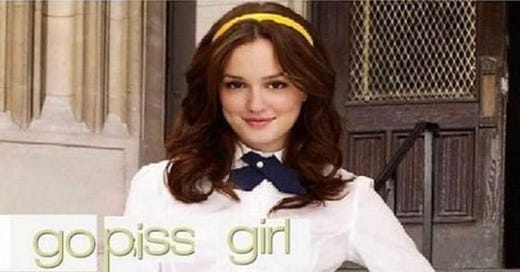Blair Waldorf: a Complicated Relationship
The last time the world agreed on something was 17 years ago, when Gossip Girl aired on the CW network.
I’ve been obsessed with Gossip Girl since grade 8. I loved the flashy shows of wealth, exclusive parties, and cutthroat personalities. Why? Because the show flaunted a type of status that no money could ever buy. I’d never debut at a Cotillion, wear Oscar de la Renta on the MET steps, or order crates of champagne to my high school. The little ways that I could replicate Gossip Girl, however, I did. I wore headbands, drank bone dry cappuccinos (gross btw), and developed a taste for the finer things in life. Maybe this speaks to some level of herd mentality intrinsic to myself… but mostly I just loved the show.
I rewatched the show over the past few weeks and I’m a little disappointed by the characters, specifically Blair. When I was 12, I idolised her loyalty and relationship (with a rapist!). This time around, her character made me sad.
Blair was the mother of evil. She told Yale recruiters her best friend killed a man, got a teacher fired, and sabotaged someone’s dream job—all in the name of ambition. At every twist and turn, Blair chose to manipulate and deceive. Her elaborate plots were both entertaining and revealed a deeply insecure person. I think that’s what made her so compelling. For her, success was never straightforward or easy. The show emphasised this with comparisons to her best friend Serena. Serena got into Blair’s dream school. Blair’s mom chose Serena to represent her label, Blair’s boyfriend was in love with Serena. Blair wasn’t charming, or “sexy,” or likeable. Victory only came when she resorted to underhanded tactics.
The parallels between the two main characters made me love Blair when I was 12. She resonates with anyone who feels they’re not special or have an intrinsic talent. She managed to build an empire everywhere she went, and made me believe that with enough effort, I could do the same.
However, six years later, I see Blair as a tragic figure. Despite her ambitious nature and all-in attitude, her schemes often backfired. Perhaps this was the writers' way of adding depth to an otherwise soapy show (no one in 2007 wanted a team drama with real problems!). Most of all, the show lost track of her goals. Blair aspired to be a magazine editor, a business owner, and even a politician, but she ended up inheriting her mother’s fashion company—a role she admitted she has no talent for. She never truly escaped the high school drama she desperately wanted to leave behind.
Perhaps I’m overanalyzing a CW show. But if you ever want a weekend of good TV, I highly recommend the first season of Gossip Girl. It’s very entertaining and sets up the characters really well. There’s a major drop in quality after the first season because a key producer left, but I don’t mind. I don't fault any writer for the direction the show took. The audience 17 years ago didn’t crave depth. The show found its groove with a reliable formula: character setup, dating mishap, new boyfriend, friendship fight, and a big scheme reuniting the cast. I probably would’ve written the show the same way.
Despite the flaws of Gossip Girl, I still love Blair Waldorf as much as I did seven years ago. She commands respect and is a force to be reckoned with. She’s also never used as a girlfriend or a side character to a man. Having a female character shamelessly in the spotlight – and not to be sexualised – is refreshing.
Gossip Girl will always have a special place in my heart. The show reminds me of a time when the world of Blair and Serena seemed both aspirational and attainable. Perhaps that’s the true allure of Gossip Girl: it allows us to dream big and scheme bigger.




